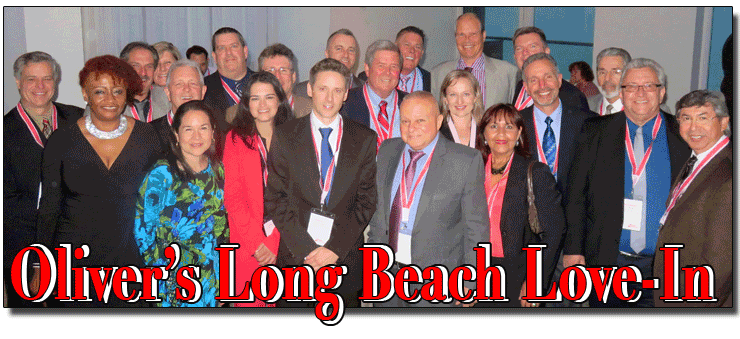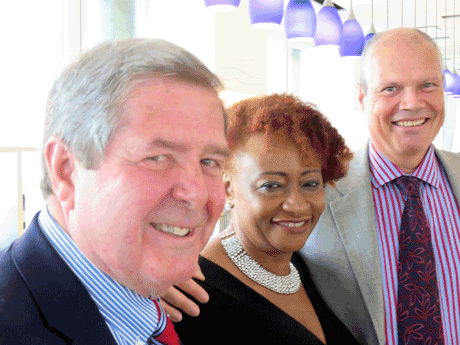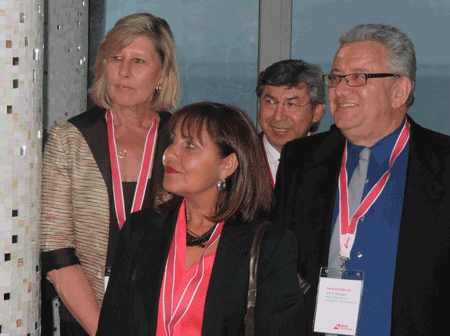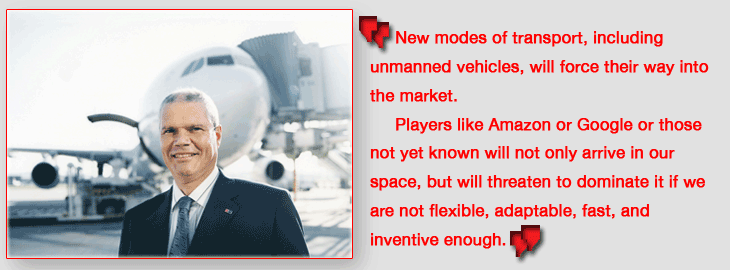
The Allegria Hotel
near JFK International Airport in Long Beach, New York, is, above all,
a party place with stunning views of the Atlantic Ocean from its towering
rooftop terrace.
It’s also known as the “Honeymoon
Hotel,” which should leave no doubt that it exists to celebrate
love almost every day.
Even on a rainy Tuesday earlier this week,
on a night that felt more like April than June, young couples at Allegria
were swaying to the music while smooching it up in the lifts. We also
noted a senior couple at ground level—obviously new partners late
in life—stepping softly while waiting for the love lift in the lobby
as we arrived.

Left to Right—Jack Lampinski, Lucy Ntuba and Oliver Evans. |
Up in the elevator, we
whooshed to the Rooftop Terrace where a party (what else?) was happening.
“Will
you miss me when the Summer is Gone?
“Who
will be with you when the Summer is Gone?”
I was thinking about those plaintive lyrics
from an old 1930s recording as we danced off the lift, landing amongst
more than 100 customers and friends that joined the Swiss World Cargo
customer event and farewell tour for SWISS’ Chief Cargo Officer
Oliver Evans, who retires this coming September.
As Summer 2015—which is yet to begin—ends,
Oliver Evans will also exit the scene. Over the past decade he has guided
the fortunes of the highly successful SWISS World Cargo, all the way up
from the bankruptcy of Swissair.
Oliver has steadied the command position
at SWC, all through the lean days and on into SWISS’ recent success
as part of Lufthansa Group.
But now, like all things in existence, the
time comes to move on.
Oliver may be exiting stage left, but that
does not mean out of air cargo, as we learn here.
We elicited some thoughts from the man of
the hour, Oliver Evans.
We asked Oliver, as someone who has attended
maybe 1,000 events during his airline career, if he could describe his
all-time favorite, and wondered what is it about SWISS that makes it so
great and successful.
OE: “The
highlight of our annual calendar is always our Cargo Forum,” Oliver
said, “that is held at various locations in the Swiss mountains,
but in recent years mostly in Lenzerheide, a delightful winter resort
high in the Swiss Alps.
“We invite at least one person from
each of our worldwide offices, as well as representatives of each of our
central services units located in Zurich, so that we number around 80
of our own people, with up to 20 guests (from other SWISS divisions, the
Board or key partners like Lufthansa Cargo, suppliers or customers).
“We have tried various formats through
the years, but we seem to have settled on a favorite: we spend two nights
together, in what has been described as a tribal gathering.
“There are a few exhortatory speeches,
much shaking of spears, consumption of all kinds of food (many imported
from all corners of the world), and—whisper it only—copious
pouring of everything liquid and enticing from caipirinha to Swiss wine,
and much attendant back-slapping and hugs.
“The normally staid community of burghers
of Lenzerheide seem to have taken to this extraordinary display, and often
join our celebrations with some quaint traditions of their own, like cowbell-ringing.
“It is fun of course, but it is also
the secret of SWISS WorldCargo’s success.”
FT: Of
what are you most proud?
OE: “Life
is very precious, and the only question I ask myself at times of reflection
is whether what I do makes a difference.
“I am delighted that SWISS WorldCargo
does indeed make a difference, and is different. Our strategy and positioning
are, and have been since the beginning, very specific, and entirely appropriate
given the advantages of our home country Switzerland.
“We have communicated them internally
as well as externally very consistently.
“SWISS has become, despite our relatively
small size, a global leader in the market segments we have targeted.
“Our brand has gone from strength
to strength, and, I venture to say, is as strong as the old Swissair brand
ever was.
“Our bosses, at SWISS and at the Group
level, ask us not to change anything, and so do our customers.
“Nothing gives me greater pleasure
than to hear external confirmation, voiced by so many, of what we have
set out to achieve. And yet we are convinced we can go much further in
our specialty field, and that is the strategy we are following.
“Call it a nice legacy if you will,
but it is the legacy of the team and not of the individual: if the mark
of a good team is consistently good results, the true mark of a great
team is that you can take anyone out of it, including the captain, without
affecting confidence in the future.”
FT: How
do you feel about leaving the company having been through the really tough
times?
OE: “Leaving
not only a company, but a group of good and loyal friends, is no easy
decision. It is true that the strength of our bonds is indeed due in no
small part to the fact that we lived through the first, very tough, years
together. The demise of Swissair was a tragedy for all those involved,
who deserve the utmost respect for what they lived through and how they
reacted.
"Yet the reality is that the team that
came together out of those ashes, had and have an enhanced and enriched
perspective precisely because of their experience, and one of the strengths
of SWISS and Swiss WorldCargo today is a tough and practical outlook,
and an attitude to the necessity of change, which were forged in those
years during and after the Swissair bankruptcy.”
FT: What
is your most vivid memory of the day Swissair was finished? How did you
feel? What was your job at the time? What you were doing, and how did
you feel the first day SWISS opened for business?
OE: “I
had the pleasure of frequently flying Swissair in the late ‘70s
and early ‘80s when I worked in New York (for a shipping company)
and had responsibilities in West Africa, which in those days was best
reached from the United States via Europe.
“I never worked for Swissair. I did
later work for KLM, and it is my connection to the former CEO of KLM,
who later became the first chairman of the new SWISS, Pieter Bouw, which
led to my appointment in Switzerland.
“I therefore learned about the personal
impact of the Swissair tragedy from my colleagues, customers, and indeed
neighbors and friends of mine in Switzerland when I settled here.
“I was astonished by the depth of
feeling regarding the bankruptcy: it was truly a national shock and trauma,
and those of us who formed the first Management Board of SWISS had 7.5
Million advisers (the entire population of Switzerland!) as we got going
in 2002 and 2003.”
 |
FT: What
is your legacy to SWISS Cargo?
OE: “A
great team is in place, and succession will be arranged smoothly (and
announced in the not too distant future).
“The team spirit, the creativity and
energy, are astonishing.
“The knowledge, experience, and reputation
have been built together. I have a very good feeling that, despite the
extreme pressure characteristic of our tough industry, the future for
SWISS WorldCargo is very bright indeed.”
FT: What
needs to be done to insure SWISS World Cargo in the years ahead?
OE: “The
top management of the airline, and of the group, need to give my successor
and his team the same support and confidence I have always enjoyed. They
need to continue to support initiatives like the drone Proof of Concept
that will be executed this summer in the Swiss Alps in cooperation with
Swiss Post, Matternet, and the Swiss regulatory authorities.
"In other words, they need to allow
room for creativity, investment, and the creation of a vision for the
industry.”
FT: Taking
an industry view, what needs to be done in the future that you wish you
might have completed?
OE: “Our
industry is very complex, the air supply chain is a co-creation, and many
things take far longer than any of us would wish.
“The most notorious of these delayed
but highly necessary developments is the elimination of paper documents
in the air supply chain, or e-freight.
“Actually the snail’s pace at
which progress has occurred could aptly be re-named e-fright.
“SWISS, like everyone else, is now
making steady progress in this respect, but this is one area in which
we will be at or near the target set by the industry (25 percent) but
far below what I would have liked to achieve.”
FT: Why
should Lufthansa continue to allow SWISS to operate on its own?
OE: “The
Lufthansa Group should continue to operate SWISS WorldCargo as an autonomous
unit because it is good for customers, staff, and shareholders.
“I personally think that this internal
debate is now finally over, and that autonomy is secure.
“But this does not mean that we have
exhausted the opportunities to learn from each other, support each other,
or even co-create solutions.
“In fact, I am investing some of my
time in the months remaining to me as chief cargo officer to build bridges
to Lufthansa Cargo in the hope that my successor will benefit from such
ties, and that both Group companies will become even stronger through
intelligent cooperation: not exhausting internal debate, but focused customer
and market-oriented activities and initiatives that enhance the strengths
of both brands and organizations.”
FT: You
have been involved in many industry events and groups.
Having just completed your term atop TIACA, what do think your legacy
will be at that organization?
OE: “TIACA
is a very precious institution, being the only association open to all
segments of the industry.
“As such it plays a unique role in
articulating the Voice of the Industry and bringing together the varied
interests of each segment and their respective bodies such as FIATA, IATA,
etc.
“I think we have made enormous progress
in developing mutual respect, understanding, and through that have issued
numerous papers defining the position of the industry to specific issues.
“Our various industry meetings are
indeed widely attended by the top representatives of the industry, its
associations, and the regulators.
“The quality of dialogue has improved
measurably.
“The composition of the TIACA Board
is more diverse and representative than ever. At the same time, it has
to be recognized that leadership of an industry association is quite different
to leadership of an enterprise. In private industry, you don’t have
to be a dictator to be in control of the entire enterprise.
“At an association, you are bound
to seek and drive consensus-building.
“Things take longer, and misunderstandings
can occur much more easily, leading to diversion of attention and sometimes
absolutely unnecessary delays. I have had the privilege to lead an outstanding
group of dedicated industry leaders, who have unselfishly helped us to
navigate sometimes turbulent waters.
“The last AGM, at which our successors
took over the helm, was a great, energizing display of unity and common
purpose that gives me great hope TIACA will now drive forward with a clear
focus on industry needs and issues.
“I am absolutely convinced that membership
will continue to grow as it has done markedly in the last 6 months, finances
will be consolidated with a great ACF in Paris in 2016, and TIACA will
go on to deliver ever broadening and deepening value to members in areas
like industry affairs, networking, and education and development.”
FT: Will
you stay involved in industry associations?
OE: “Leadership
development has always been my passion, and there are so many exciting
initiatives at TIACA, including not only the already-launched Development
Program but also so many other fertile ideas that I am intending to apply
myself to supporting this transformation as a member of the Education
and Research Committee.”
 |
FT: What
is next for Oliver Evans in air cargo?
OE: “I
am stepping down from my roles at TIACA and SWISS WorldCargo, and I will
seek to have a little more free time than I can enjoy now.
"But my passion for the industry is
undiminished, and I am setting up during the course of the summer my own
company to serve as a vehicle to support and lead initiatives in the field
of change management and leadership coaching.
“I will not employ anybody, but make
myself available to engage with developments that excite me and where
my experience and ideas can help us all get ready for the future.”
FT: If
you were facing an audience of youngsters today would you make the case
for an air cargo career?
OE: “I
have done so all my life and will never cease to do so: we are living
in a globalized world, and in an age of ever-accelerating transformation
through technology. Youngsters are eager to make a difference and have
far greater ambition or self-belief than previous generations ever did.
They truly believe that they can make a difference on a global basis.
“What other industry offers them opportunities
to lead global trade, to be in touch with people from all over world on
a daily basis, to learn what is happening in all of the industries supported
by airfreight?
“How would you do that; what would
you say? Trust yourself, believe in yourself, and embrace the opportunities
created by disruption and change.
“Do not wall yourself in behind hierarchies,
authority, or company boundaries like the leaders of yesterday did. Instead,
open yourself up and make yourself vulnerable, because that is the path
to self-knowledge and a strength that comes from within, and which is
far greater than the old and now discredited claims to strength and security
of the past.”
FT: What
does air cargo as we know it—both the freighter and combination
business—need to insure its future?
OE: “There
will always be air cargo, because it is the mode of transport best suited
to delivering the most valuable and care-intensive commodities and products
invented by mankind.
“The market will be wide enough to
embrace both freighters and combination carriers, and to make their business
profitable.
"New modes of transport, including
unmanned vehicles, will force their way into the market.
“New players like Amazon or Google
or those not yet known will not only arrive in our space, but will threaten
to dominate it if we are not flexible, adaptable, fast, and inventive
enough.”
Geoffrey |





